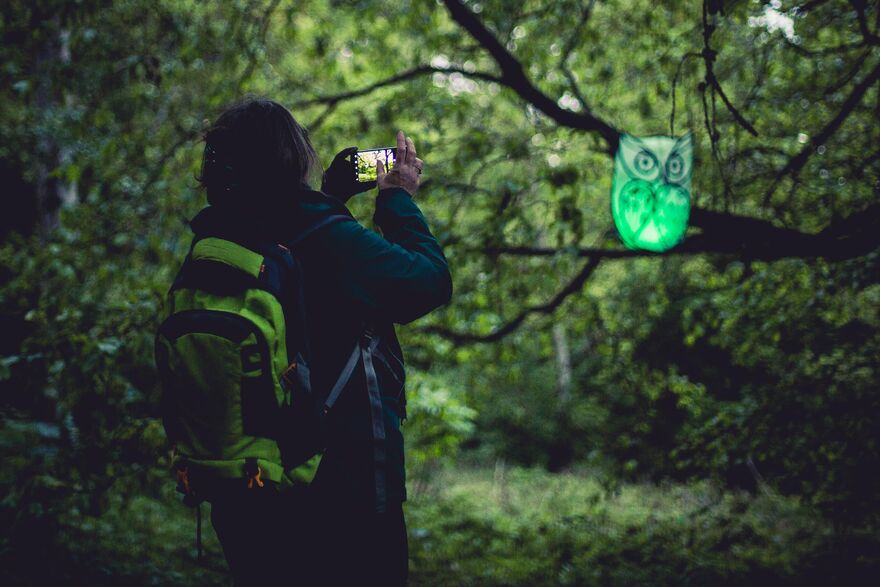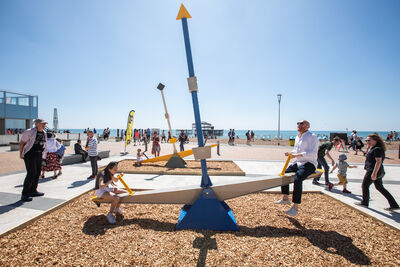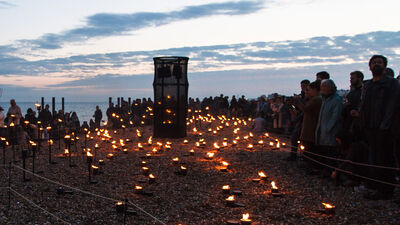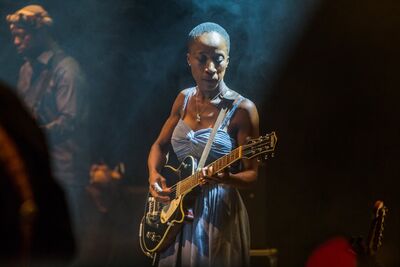
Supporting the Environment
Learn more about what Brighton Dome and Brighton Festival is doing to be more sustainable
Our Organisation
Brighton Dome & Brighton Festival (BDBF) is a registered charity employing 150 permanent employees and many more hourly paid staff, freelancers, volunteers and creatives.
We are funded by the Arts Council England, The National Lottery Heritage Fund, Brighton & Hove City Council and the generous donations of corporates and individuals. We also very much rely on commercial income from venue hires, bar sales, catering and merchandise at Brighton Dome to support the core objectives of the organisation.
The purpose of BDBF is to enable extraordinary arts experiences where people come together to enjoy, imagine, create and change.
We reach audiences annually of 670,000 across all art forms presented in the Brighton Dome venues and at the annual Brighton Festival each May.
At the very heart of our activities is our aim to run an ethical organisation, where our legacy is a positive one and we can use our influence to encourage socially conscious behaviour in all those we interact with. This includes the need to recognize and address the climate emergency and we aim both to reduce our own impact and to encourage everyone who connects to us to take responsibility for their impact to the environment too.
We believe that every member of staff has an important role to play in making BDBF more environmentally sustainable and that sustainability should be woven through every decision taken whether these be to invest in consumables and equipment, to work with contractors and to engage with artists.
2030
In June 2019 the UK Government committed to bringing all greenhouse gas emissions in the UK to NET ZERO by 2050, with the view to prevent global temperatures from increasing more than 2 °C (ideally no more than 1.5°C) above the temperature benchmark set before the beginning of the Industrial Revolution.
BDBF is looking towards 2030 when we aim to reach net zero in our own operations. 2030 acts as a milestone to 2050. We will also by 2030 have firmly embedded the expectations we will set for our suppliers and value chain.
Being environmentally sustainable goes hand in hand with being financially sustainable; as we seek to reduce our environmental impacts and protect the planet’s future for the next generations, we reduce the financial burden to the organisation and protect our own.

Brighton Festival
Brighton Festival runs across Brighton and Hove and surrounding area for three weeks each May. Each event is individually ticketed.
Brighton Festival predominantly produces events in indoor spaces, professional venues, community space or found space like abandoned buildings. There are also exciting commissions and works presented outdoors in areas such as parks or other open land and in the streets of the city.
Climate change is having a direct impact on the work of Brighton Festival as our outdoor activities are now more at risk of cancellation for safety reasons as a result of increasing storms and the unpredictability of weather.

Audiences
How our audiences choose to travel to events during the Brighton Festival represents the most significant C02 impact arising from our business.
Audience travel is a factor considered in the location of each site to ensure each show can be reached by public transport.
- We’re encouraging audiences to reduce car usage and where they cannot walk or cycle readily to us, to use the available public transport.
- In 2023/24 we were delighted that 30% of the Brighton Festival audience chose a carbon free transport option by walking and cycling and that overall including public transport that 68% travelled sustainably to our events.

Buildings
The nature of live entertainment means that electricity consumption creates one of the organisation’s other main carbon impacts.
Brighton Dome venues, where many of Brighton Festival’s events are presented, is working to reduce consumption and invests in 100% renewable REGO backed electricity.
- We measure and monitor the Brighton Dome venue’s consumption of gas, electricity and water, using the Arts Council via Julie’s Bicycles Creative Climate Tools to understand our carbon footprint and track progress to reduce this.
- We encourage other venue’s which stage Brighton Festival events to consider their environmental impacts and work with them to produce our events in the most sustainable way possible.
- We’ve relocated our staff team to modern, more environmentally sustainable office accommodation alongside encouraging hybrid working.
- Wherever possible our temporary event sites use power from the grid. We work closely with Brighton and Hove City Council to select sites that offer existing utilities such as water, power and natural perimeters to avoid bringing in additional infrastructure. In unusual spaces not designed to be used for performances we seek out spaces where we can work with local residents and businesses to use their infrastructure. Where temporary power is needed we hire the most sustainable option that will support the power needs of an event applying the Vision 2025 Green Events Code.

Waste
- We reduce consumption by borrowing or reusing where possible and recycling. Brighton Dome collects staff and bar food waste for composting. In 2023-24 we achieved a recycling rate of 75% at the venues. The remaining general waste was sent to a heat recovery centre, diverting this away from landfill.
- We use e-tickets which saves approx. 250,000 printed paper tickets, ink, electricity and also the post office collection and delivery travel impacts.
- We’re on the way to ridding the Brighton Dome venues of single use plastic.
- Our bars have banished bottled water, saving around 10,000 bottles per year and are serving drinks in reusable cups or in glass saving around 250,000 disposable plastic cups from needing recycling.
- We print our brochures on recycled paper, reduce unnecessary packaging and keep a close eye on the amount of print we produce, maximizing digital technology. Any leftover print is always recycled.
- Promotional materials such as banners are designed in such a way as to be re-usable and not be binned after each Festival or project. Our T Shirts are reworn by staff and not treated as disposable items.
- We find ways to reuse our sets – The Riwaq was built as a unique performance space for Brighton Festival 2022 and was found a new home.
- We ensure audiences have access to recycling facilities and we leave outdoor sites as we find these - with only the memory of unique experiences behind.

Travel
- Many of Brighton Festival’s staff are working partially at home, saving on carbon impact of the daily commute.
- We think before travelling to do our business, utilizing online meeting technology wherever we can. Where business travel is unavoidable we are choosing the most sustainable means to getting there and recognising this impact within our carbon footprint.
- We encourage our staff to commute to work sustainably through schemes such as BetterPoints which incentivizes sustainable travel, sustainability competitions to reward the most carbon saved during Brighton Festival and by providing loans for bicycles, providing staff showers, and promoting walk/cycle maps.

Procurement
- We support and apply the principles of the Social Value Act 2012 through our procurement of services and products and make economic, social & environmental benefits to the community core aims within our everyday work. How our suppliers think about sustainability matters to us and forms a part of our procurement process.
- We prioritise local suppliers to minimise carbon footprint of travel & transport.

Communications
- We communicate our mission and encourage others to recognize and respond to the climate emergency. We engage with our staff, artists, stakeholders, audiences and our community on sustainability issues.
- 60% of our permanent staff have received accredited Carbon Literacy Training, embedding our organisational objectives and a planet positive approach away from work.
- We actively participate in national & local networks committed to reducing impacts across the arts, sharing experiences and resources, all with the common goal to reduce our carbon impact and be more planet positive.
- We programme events exploring environmental themes and hope to use our work to share the urgency of the climate crisis and inspire our audiences to be more environmentally aware.
This statement is supported by a 3 year Environmental Action Plan and annual plans. The action plan is informed by our environmental monitoring and measurement and fed by the passion and creativity of our staff Green Team and Management Team. The Action Plan is reviewed and updated on an annual basis.
The Environmental Statement and Action Plan was developed using guidelines from Julie’s Bicycle.


Our Mission and Purpose

Our History

